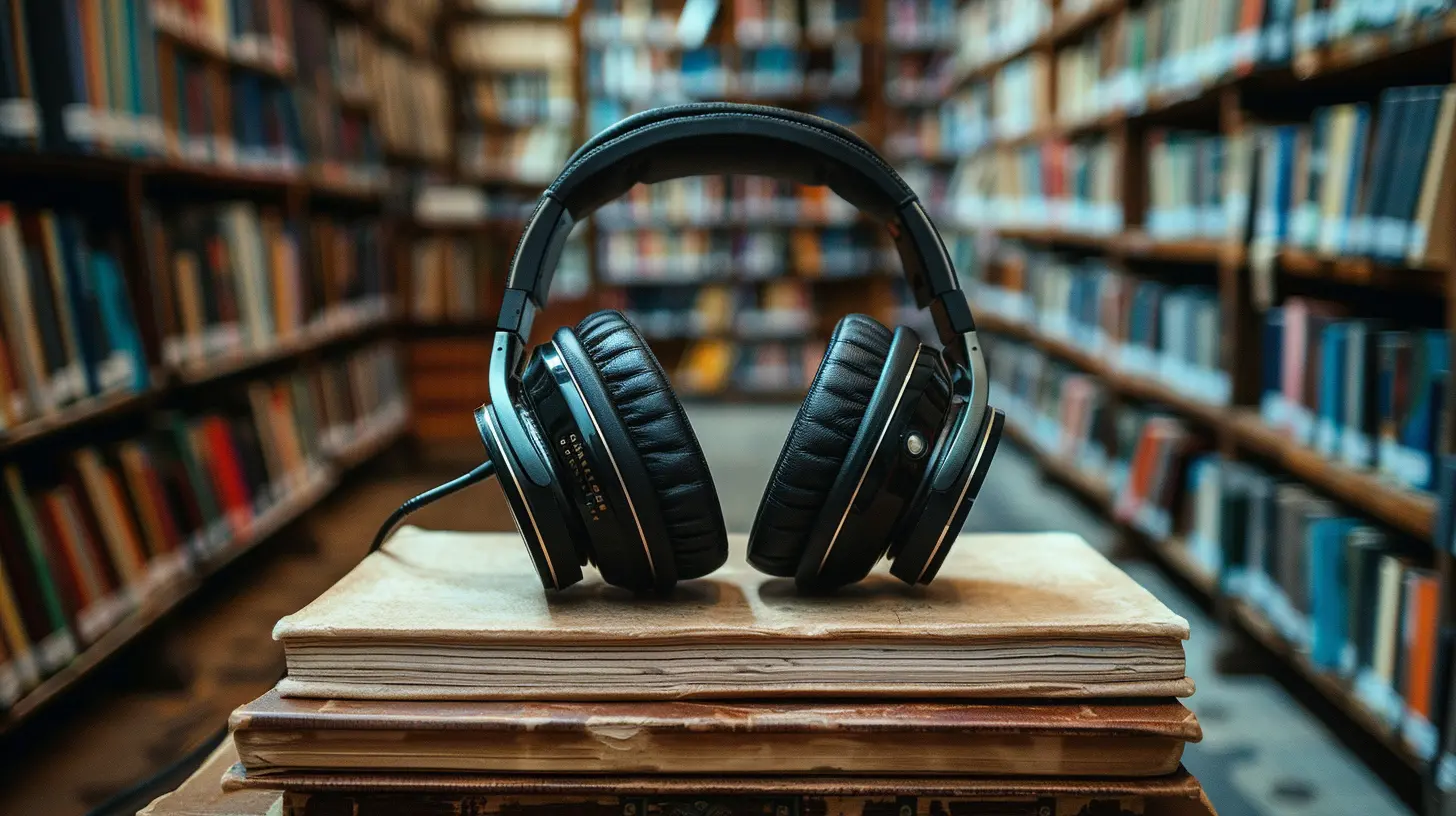The Role of Podcasts and Audiobooks in Lifelong Learning
3 September 2025
Imagine this: You're stuck in traffic, crawling at a snail's pace, or maybe you're out for a run, trying to make exercise less of a chore. What if I told you that instead of just zoning out or endlessly scrolling, you could be expanding your knowledge? Welcome to the magic of podcasts and audiobooks—a gateway to lifelong learning that fits effortlessly into your everyday life.
Gone are the days when learning was confined to dusty textbooks and rigid classroom schedules. Today, knowledge is dynamic, portable, and—thanks to audio content—more accessible than ever. But how exactly do podcasts and audiobooks play a role in lifelong learning? Let’s dive in.

The Rise of Audio Learning
Audio-based learning has exploded in popularity. Whether you're interested in history, science, self-improvement, or business strategies, there's an audiobook or podcast out there for you. Unlike traditional learning, which often requires us to sit down and focus, audio learning allows for multitasking. You can learn while cooking, commuting, or even while drifting off to sleep (though how much you actually absorb in your dreams is debatable).The convenience factor is a game-changer. It means that lifelong learning isn't just for students or professionals—it's for anyone with a curiosity for new ideas and a pair of headphones.

Why Podcasts and Audiobooks Make Learning Easier
1. Learning On the Go
We all have those moments where we’re physically occupied but mentally bored—washing dishes, jogging, waiting in line. Instead of mindlessly scrolling through social media, you can use that time to soak in new knowledge. Podcasts and audiobooks turn these dull moments into productive ones.2. Retention and Comprehension
Think back to school—how often did you really remember what you read in a textbook? Now, contrast that with how effortlessly lyrics from a song get stuck in your head. There’s a reason for that. Studies show that hearing information, especially when spoken engagingly, improves retention and comprehension. Podcasts, often featuring expert discussions and storytelling, make learning far more memorable than staring at a page.3. Access to World-Class Knowledge for Free
Formal education can be expensive. But many podcasts (and even some audiobooks) provide free, high-quality education from experts and intellectuals across the world. Want to hear lectures from Ivy League professors? There’s a podcast for that. Want to learn about psychology, business, or space exploration? You don’t need to enroll in an expensive course—just press play.4. Diverse Learning Styles Supported
Some people love reading; others absorb knowledge better when they hear it aloud. Podcasts and audiobooks cater to auditory learners, who might struggle with traditional text-based resources. Even for visual learners, combining reading with audio reinforcement can strengthen understanding.
How Podcasts Aid Lifelong Learning
When it comes to lifelong learning, podcasts have a unique advantage: they’re conversational, engaging, and usually updated frequently, keeping the content fresh.1. Easily Digestible Information
Podcasts break down complex subjects into bite-sized, engaging discussions. Unlike academic lectures that sometimes leave you feeling like you need a dictionary and a caffeine IV, podcasts present information in a casual, relatable way. Many even use humor to make difficult topics more digestible (because let’s be honest, some subjects need all the help they can get).2. Exposure to Different Perspectives
One of the coolest things about podcasts is the sheer variety of voices you’ll hear. You're not just learning facts—you’re gaining insights from different cultural, professional, and personal perspectives. This exposure broadens your worldview and helps develop critical thinking skills.3. Encourages Critical Thinking and Debate
Many podcasts tackle controversial topics or present multiple viewpoints on an issue. This challenges listeners to think critically, analyze arguments, and form their own opinions. You might start a podcast with one perspective and end it questioning everything you thought you knew—now that’s learning.4. Motivation and Inspiration
Ever had one of those days where you feel stuck in a rut? Motivational and self-improvement podcasts can give you that much-needed push. Hearing success stories, expert advice, or even just a fresh perspective can boost your motivation to keep growing and improving.
How Audiobooks Enhance Lifelong Learning
Audiobooks offer a slightly different but equally powerful learning experience. Unlike podcasts, which are typically short-form and discussion-based, audiobooks dive deep into subjects, offering comprehensive knowledge.1. Deep Learning on Any Subject
Want to fully understand a topic? Audiobooks allow you to do that without flipping through hundreds of pages. Whether it's history, psychology, philosophy, or business, audiobooks give you long-form content that you can absorb while doing other tasks.2. Saves Time
For those who struggle to find time to sit down and read, audiobooks are the perfect solution. You can “read” while jogging, driving, or even cleaning your house.3. Improves Listening and Focus Skills
Active listening is an underrated skill. Unlike skimming through a text, audiobooks force you to focus on the spoken word, which can improve comprehension and attention span over time.4. Perfect for Revisiting Favorite Books
Ever wished you could re-read a book but just didn’t have the time? Audiobooks make revisiting books easier. You can relisten to key insights while going about your daily life, reinforcing knowledge without extra effort.The Best Ways to Incorporate Audio Learning Into Your Routine
1. Make It a Habit
Try replacing some of your daily screen time with audio learning. Instead of scrolling social media for 30 minutes, listen to a podcast episode. Swap out TV before bed for an audiobook.2. Choose Content That Interests You
Let’s be honest—if the content is boring, you’re not going to stick with it. Pick topics that genuinely excite you. Whether it's neuroscience, marketing, or self-help, make sure it's something that sparks your curiosity.3. Engage With the Content
Jot down key takeaways, discuss them with friends, or even talk back to your podcast host (we all do it). The more you engage, the more you retain.4. Mix It Up
Variety keeps things interesting. Switch between non-fiction and fiction audiobooks, serious and lighthearted podcasts, short episodes and deep-dive discussions. A mix will keep you engaged and prevent burnout.
Final Thoughts
Lifelong learning isn't about sitting in a classroom forever—it's about continuously feeding your curiosity, expanding your perspective, and keeping your brain active. Podcasts and audiobooks make that easy, fun, and incredibly accessible.So next time you're stuck in traffic, sweating on a treadmill, or folding an endless pile of laundry, press play on something meaningful. Because learning shouldn't stop after graduation—it should be a lifelong adventure.
all images in this post were generated using AI tools
Category:
Lifelong LearningAuthor:

Olivia Lewis
Discussion
rate this article
1 comments
Zephyrae Cox
Absolutely loved this article! Podcasts and audiobooks make learning enjoyable and accessible—perfect companions for a lifelong journey of growth! 🎧📚
September 23, 2025 at 3:03 AM

Olivia Lewis
Thank you so much! I'm glad you enjoyed it and agree on the transformative power of podcasts and audiobooks for lifelong learning! 🎧📚


